This post may contain affiliate links. Please read our disclosure policy.
These pumpkin oatmeal cookies are packed with pumpkin flavor, and still chewy and rich, not cakey like many pumpkin treats. All without any “regular” flour at all!

Why this recipe works
Most pumpkin cookies puff up like little cakes, but since these are oatmeal cookies, I needed to find a different way. Using pumpkin butter instead of purée keeps the flavor deep and the texture chewy, not fluffy. You can buy it or make your own.
Oat flour provides all the structure here, rather than regular flour, which enhances the hearty taste. And rolled oats stay whole and chewy, so these cookies taste like the best oatmeal you've ever had, but in cookie form.
And because the dough starts with the reverse-creaming method, the butter coats everything before the wet ingredients go in. That’s how you get cookies that stay rich, tender, and perfectly chewy all the way through, with no unwanted puffiness.
Recipe ingredients
Here are the ingredients necessary to make these beautiful, super flavorful oatmeal cookies, along with a quick explanation of the role each plays in the perfect end result:

- Oat flour: Helps create structure for the cookies in the absence of any “regular” flour, and adds a lightly sweet, earthy flavor. You can grind your own from old fashioned oats, or buy packaged oat flour. I usually buy Gold Medal brand or Bob's Red Mill brand oat flour. If you're gluten free, just be sure that you buy the package that is labeled “gluten free”.
- Old-fashioned rolled oats: Unlike oat flour, they keep their shape during baking, adding texture, chew and heartiness. They also create that beautiful craggy top as the cookies cool. Again, be sure to use oats labeled gluten free if you're following a strict gf diet.
- Granulated sugar/light brown sugar: Add sweetness and lock in moisture. The white sugar helps the cookies spread and crisp during baking; the brown sugar adds depth of flavor and moisture.
- Baking soda: Helps the cookies brown in the oven and spread a bit during baking.
- Salt: Brightens the other flavors and balances sweetness.
- Pumpkin pie spice: A combination of the warm fall spices of cinnamon, ginger, allspice, cloves and nutmeg. In combination, they make the cookies smell and taste like we think pumpkin should, and contribute to their rich golden appearance.
- Butter: Adds richness, tenderness and moisture, and helps the cookies spread in the oven for varied texture.
- Pumpkin butter: A smooth, spreadable mixture made from cooking canned pumpkin puree with rich-tasting sugar like honey or maple syrup and many of the spices in pumpkin spice to deepen flavor and reduce moisture. Pureed pumpkin itself often adds too much moisture and too little flavor to baked goods, and tends to make baked goods cakey, not chewy. You can make your own pumpkin butter, or buy it premade from Trader Joe's, Stonewall Kitchen, or Williams Sonoma, among other. To make this recipe without pumpkin butter, see the substitutions section below.
- Egg: Binds the cookies together, helps them rise, and adds structure that holds the rise as they cool.
- Chocolate chips: I usually add chocolate chips to these cookies because I love the pumpkin-chocolate flavor combination, and it adds some texture. It also lowers the moisture content of the cookies, so if you leave out the chips, the cookies will spread a bit more. You can also replace them with small dried fruit like raisins, or a different flavor chips.
How to make pumpkin oatmeal cookies (step by step photos)
See the recipe card below for the full recipe with precise ingredient amounts. These are step by step photos to help guide you as you make these cookies in your kitchen, with an explanation of why the instructions are what they are:
1. Combine the dry ingredients
Mix together all of the dry ingredients, including the oat flour, baking soda, salt, pumpkin spice, brown and white sugar, and rolled oats. There's no need to whisk the thinnest dry ingredients before adding the brown sugar, which tends to clump, and the larger whole oats, since we mix everything together again in the next step.
2. Add the butter
For the chewiest cookies that don't rise too much in the oven, we use the “reverse cream” method of pressing softened butter into the dry ingredients before adding the rest of the wet ingredients.
Press down with the back of the mixing spoon to work the butter in without incorporating air into the dough. This will also serve to break up any lumps in the brown sugar. When the butter is fully incorporated, the mixture will look like coarse, moist sand, without any completely dry patches.



3. Add the wet ingredients
Make a well in the center of the dry mixture, and add the beaten egg and pumpkin butter. They'll mix in to the dry ingredients quickly and easily, bringing together the mixture into a thick, soft and sticky cookie dough.
4. Add the chocolate chips (optional)
I love chocolate chips in cookies of all kinds, including my classic gluten free oatmeal cookies. But you can skip this step altogether (your cookies will spread a bit more, that's all), or replace them with any other dry mix-in pieces like raisins, chopped pecans or walnuts, or a different flavor chip.




5. Portion the dough
Divide the dough into 10 roughly equal portions of dough. A medium-size spring-loaded ice cream scoop is ideal for this. I use the OXO medium cookie scoop, which is equivalent to a #40 scoop, which holds 1.5 tablespoons. For perfectly even cookies, weigh the portions at 50 grams each.
If you're using a spoon to portion cookies, you'll want moisten your palms and roll them into rounds so your cookies don't come out too misshapen. Be sure to leave at least 1.5 inches in between your raw cookie dough since they'll spread quite a bit during baking.
6. Bake
Bake at 350°F until done, about 12 minutes. Since ovens vary so much, and most have hot spots, baking times are always approximate. It's best to gauge doneness by appearance, and these cookies are done baking when they're spread to about double their original size, look golden brown all over, with darker edges and they don't appear raw or wet in the very center.
Let the cookies cool for at least 10 minutes on the baking sheet, since they're not stable when they're still hot from the oven.



Expert tips
Use wet hands
This cookie dough is thick enough to hold a shape, but still very sticky even after it's been chilled. If you're using a spring-loaded ice cream scoop to portion the dough, it will create a nice tall mound of cookie dough that there's no reason to handle further. But if you're not, roll each portion of dough into a round ball gently between slightly wet palms to ensure your cookies melt into the right uniform round shape in the oven.
Use sifted oat flour
Especially in a recipe like this that contains rolled oats and oat flour, it's not essential to use very fine-grain oat flour. But since the oat flour binds the cookies together, it's most effective if you have the full amount of flour without any larger pieces.
If you're grinding your own oat flour in a blender from whole oats, try sifting it before measuring out 90 grams for the cookies. You can also try using packaged oat flour, rather than grinding your own, for the most uniform cookies.

Ingredient substitutions
If you have additional allergens you need to avoid like dairy, eggs, or oats, or don't have and don't want to buy pumpkin butter, here are my suggestions so you can still make these cookies:
Dairy free
In place of dairy butter, I recommend trying block-style vegan butter, like Melt or Miyoko's Creamery brand. Virgin coconut oil (the kind that's solid at room temperature) might work, too.
Egg free
I think you could replace the egg with a “chia egg,” made by mixing 1 tablespoon ground chia flour with 1 to 2 tablespoons lukewarm water. If you've had success using Bob's Red Mill's egg replacer in the past, that might be worth trying here, too.
Oat-free
Even though the grain structure of these cookies is provided only by oat flour and old fashioned rolled oats, you should be able to use a substitute for oats to make them. In place of oat flour, I recommend grinding quinoa flakes into a very fine powder, and then sifting out any larger pieces that remain. In place of old fashioned rolled oats, try flattened or beaten buckwheat or rice.
Pumpkin butter
If you don't have pumpkin butter and don't want to buy or make it, you can use canned pumpkin puree, but you'll need to reduce its moisture, and add maple syrup. The cookies will be thicker and more cakey, and will take longer to bake (about 17 minutes). Here is what you'll add and how to prepare it:
- 100 grams of canned pumpkin puree blotted of extra moisture with paper towels until reduced in weight by 1/3 (66 grams);
- 2 tablespoons (42 grams) pure maple syrup, at room temperature; and
- 1 extra teaspoon pumpkin pie spice
Pumpkin pie spice
If you can't find pumpkin pie spice, you can make your own by combining warm fall spices in these proportions:
- 1 teaspoon ground cinnamon
- 1/2 teaspoon ground ginger
- 1/4 teaspoon ground allspice
- 1/4 teaspoon ground cloves
- 1/8 teaspoon ground nutmeg

Pumpkin Oatmeal Cookies Recipe
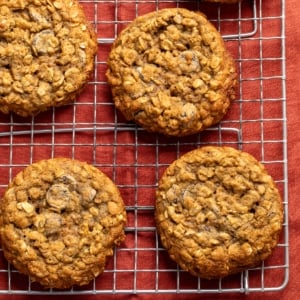
Ingredients
- ¾ cup (90 g) oat flour, gluten free if necessary
- ½ teaspoon baking soda
- ½ teaspoon kosher salt
- 1 teaspoon pumpkin pie spice
- ¼ cup (50 g) granulated sugar
- ¼ cup (55 g) packed light brown sugar
- 1 cup (100 g) old fashioned rolled oats, gluten free if necessary
- 4 tablespoons (56 g) unsalted butter, at room temperature
- 4 ½ tablespoons (80 g) pumpkin butter, at room temperature (See Recipe Notes)
- 1 (50 g out of shell) egg, at room temperature, beaten
- ½ cup (4 ounces) semi-sweet chocolate chips, (optional)
Instructions
- Preheat your oven to 350°F. Line a large rimmed baking sheet with parchment paper and set it aside.
- In a large mixing bowl, place the oat flour, baking soda, salt, pumpkin spice, granulated sugar, brown sugar, and oats, and mix to combine well. Break up any lumps in the brown sugar.
- Add the butter, and mix with the back of the spoon until it’s evenly distributed throughout the dry ingredients. The mixture should look like coarse, slightly wet sand.
- Create a well in the center of the dry ingredients, and add the pumpkin butter and egg, and mix to combine. The dough will be very thick and relatively sticky.
- Mix in the optional chocolate chips until evenly distributed throughout the cookie dough.
- Divide the dough into 10 equal portions, each about 50 grams. I used a medium ice cream scoop.
- Place the portions on the prepared baking sheet about 1 1/2 inches apart from one another. If the mounds of raw dough seem misshapen, roll each piece of dough into a round between clean, moistened palms and replace on the baking sheet.
- The dough will be thick, and very sticky. If it seems too sticky to handle and you'd like better rounds of dough, chill it briefly in the refrigerator on a separate surface for 10 to 15 minutes first. Then, roll gently, and return to the baking sheet.
- Bake in the center of the preheated oven until lightly golden brown all over, golden brown around the edges, and no longer wet in the center (about 12 minutes).
- Remove from the oven and allow to cool until set on the baking sheet (about 10 minutes) before serving.
Notes
Nutrition
Nutrition information is automatically calculated, so should only be used as an approximation.
Storage instructions
Once the cookies are completely cool, store them in a sealed container and they'll stay fresh for up to 5 days at room temperature.
For longer storage, place the cookies flat on a small baking sheet and freeze until solid. Then, transfer the frozen cookies to a freezer-safe zip-top bag, squeeze out as much air as possible, and seal tightly. Freeze for up to 3 months, and defrost at room temperature.
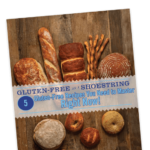

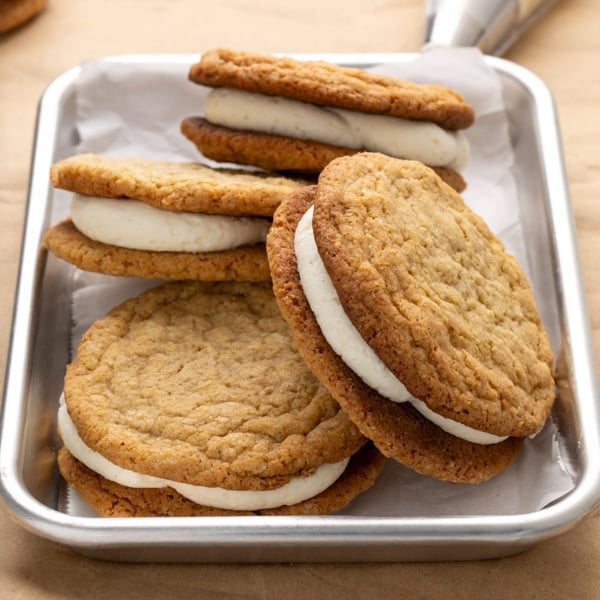
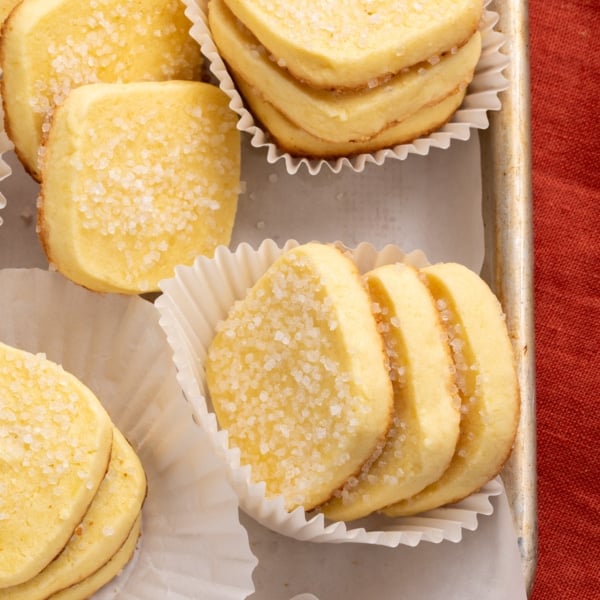
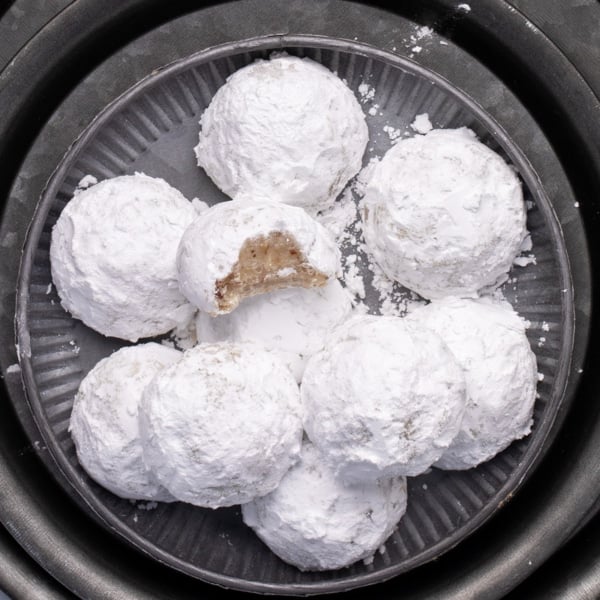
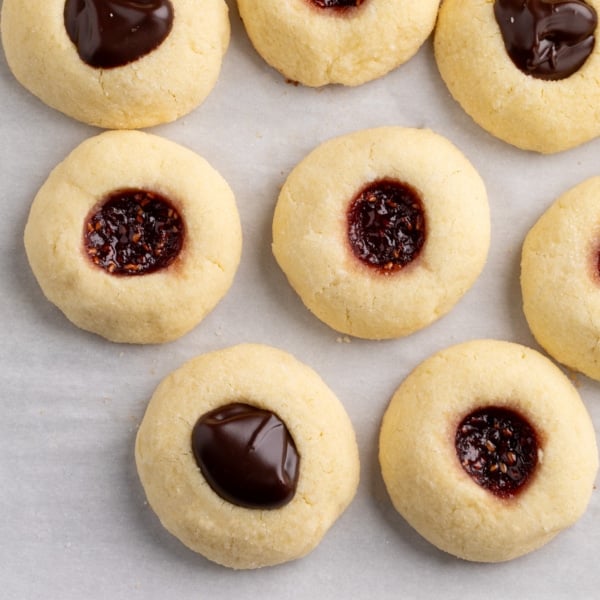









Can this dough be refrigerated to bake the next day?
Hi, Kelly, yes, you can definitely do that. Let it warm a bit before baking so you get the proper amount of spread in the oven, though. I did find that, when I refrigerated it for longer than a day, though, the cookies had less varied texture. Oat flour alone absorbs liquid more fully than a balanced all purpose gluten free flour blend, keeping the cookies more moist throughout after a prolonged rest.
Delicious
So glad you enjoyed them, Danica! Thank you for sharing your experience.
How much pumpkin butter does the 120g packed pumpkin and 120g palm sugar make? I made pumpkin butter using 48 oz pumpkin for another recipe and would like to use some of that if possible. Great recipes, I have 3 of your books.
As I state in the recipe for homemade pumpkin butter, Elsie, it makes about 4 cups. I’m afraid I can’t predict how much you’d need for another recipe.